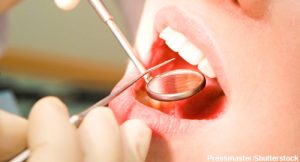 Patients with self-reported and clinically diagnosed ankylosing spondylitis (AS) may be at increased risk of oral ulcers, which may reflect that these patients have worse oral health overall than the general population. Hadeel Mohammed Abbood, a graduate student at the University of Aberdeen, Scotland, published an analysis online in the Journal of Applied Oral Science. This research is the first study to investigate the association between toothache and AS.1
Patients with self-reported and clinically diagnosed ankylosing spondylitis (AS) may be at increased risk of oral ulcers, which may reflect that these patients have worse oral health overall than the general population. Hadeel Mohammed Abbood, a graduate student at the University of Aberdeen, Scotland, published an analysis online in the Journal of Applied Oral Science. This research is the first study to investigate the association between toothache and AS.1
The study evaluated data from the U.K. Biobank, which is designed to investigate exposure-disease association. The U.K. Biobank documents oral health conditions in general and does not clarify individual conditions. Additionally, the nested, case-control study was limited by an inability to determine temporality in the association between oral health conditions and AS.
Researchers analyzed 1,307 cases of self-reported AS, which were compared with 49,1503 controls. The mean age of patients was 58 years and the mean age of the controls was 57 years. The AS and control groups were largely similar, but the AS group had more men (62.9%) than the control group (45.8% men). For clinically diagnosed AS, investigators used 153 AS cases (73.9% men) and 49,0351 controls (45.8% men). Oral problems were self-identified by patients.
“Using self-report to identify oral conditions, as was done in this study, may spoil the findings, however, due to issues related to non-feasibility of the clinical diagnosis, cost and time in large epidemiologic studies, the use of self-reported measures is justifiable,” write the authors in the discussion. “Self-reported oral conditions were found to be able to identify oral conditions when confirmed with a clinical diagnosis.”
The study revealed an association between AS and oral ulcers, but not other oral conditions. Bleeding gums and other oral problems can be shared manifestations and markers of periodontitis and dental caries. Alveolar bone provides periodontal support to teeth, and its destruction from advanced periodontitis can loosen teeth. Individuals who have dentures have lost their teeth completely possibly from periodontitis, dental caries and/or trauma. The investigators found the association between AS and ulcers persisted when they excluded patients with dentures.
“Other oral conditions, such as painful gums, bleeding gums, loose teeth, toothache and reporting having dentures, were not associated with AS. However, their prevalence was generally higher in the AS than in the control group,” write the authors.
The study did not reveal whether a link exists between a specific type of oral condition and AS, but the results do suggest patients with AS appear to have worse oral health than controls. The authors conclude that these findings justify further investigation with clear and concise definitions of oral diseases.



